Ans: Every CRM in this article is the best and simplest. It depends on what else you are looking for besides simplicity.
The Best CRM for Small Business for Real Change and More Sales!
Every large corporation or business was once a small enterprise. Therefore, even if you are searching for the best CRM software for a small business, thorough research is essential. You cannot rely on any tool to manage your business for a long time—no one can afford to switch CRM systems every other day.
Thus, to make your research easier, we have curated a selection of the best CRM for small businesses. You won’t need to look elsewhere and can find what you require right from the comfort of this informative guide. Let’s begin our discussion with our first CRM software—Vtiger.
1. Vtiger
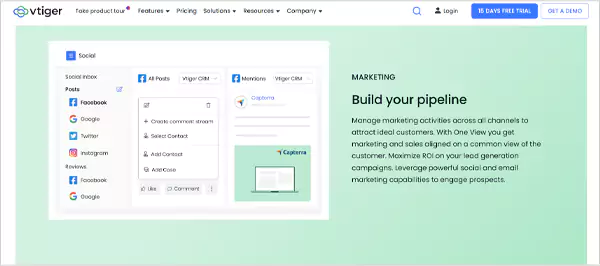
Vtiger is the best CRM for small businesses. It offers highly customizable layouts with advanced AI capabilities, so every enterprise can maximize their sales efforts and achieve the highest conversion ratio possible.
This is an all-in-one CRM platform that combines marketing, sales, and customer support teams with unified data for an enhanced one-view experience. Furthermore, Vtiger only charges according to the level or degree of access to the software.
Features: Sales Automation, Sales Enablement, Pipeline Management, Sales Engagement, Artificial Intelligence, and more.
Pricing: $15 per user a month when billed annually.
Consider its major pros and cons below.
| Pros | Cons |
| Vtiger enables users to tailor or customize various parts of the CRM as per their specific needs and requirements. | Initially, for some users, using Vtiger might pose a challenge with a steep learning curve. |
| This CRM platform offers responsible customer support for all its users to expedite the training process and help capitalize on each functionality. | Users might have to face minor glitches occasionally. |
| It offers seamless automation across marketing, workflow, and helpdesk to streamline key business processes. | |
| The software offers multiple features and functionalities for the clean, neat, and organized look of raw and processed leads at various stages of sales or pipeline. | |
| Vtiger can be used on a mobile phone. It works the same on both Android and iOS devices. |
2. Flowlu
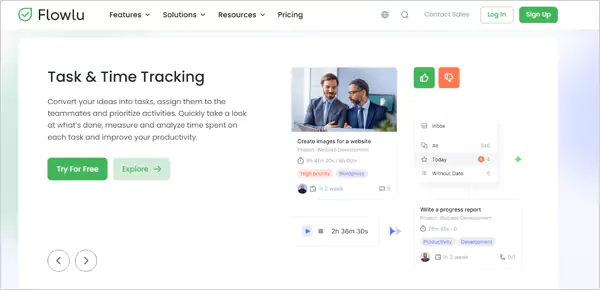
Flowlu is another name on our list of the best CRM for small businesses. This software works the same—fabulous—across all technologies such as the Web, iOS, and Android.
The company markets Flowlu as a unified business platform for simple work management. A small company can integrate this CRM into its workflow and capitalize on its state-of-the-art features for better project, task, and financial management.
Features: Online CRM, Project Management, Task Management, Financial Management, Online Invoicing, and more.
Pricing: Free plans are available with the upgrade cost of $6.12 per user per month.
Known for its finance features and robust agility, Flowlu has the following major pros and cons.
| Pros | Cons |
| Flowlu offers cutting-edge tools for task and project management. | Email automation might seem less useful than the competition. |
| A user can also manage key financial areas effectively, such as estimates, invoicing, cash flow, etc. | Some features might pose a steep learning curve. |
| Flowlu boasts a user-friendly interface. | This CRM software doesn’t have a resident or native AI. |
| Being a feature-rich option, this CRM software ensures enhanced collaboration capabilities as well. |
3. Zoho CRM
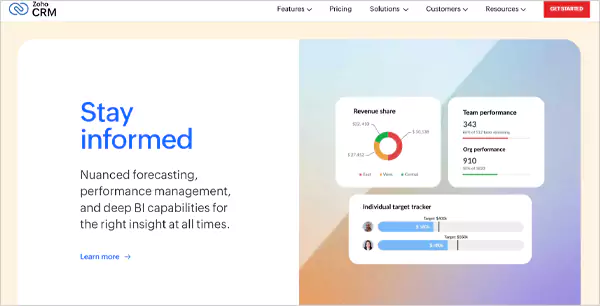
Next, on the list of the best CRM for small businesses, there is Zoho CRM. It boasts a very impactful and helpful AI capacity, along with a plethora of practical features.
This CRM is trusted by many big names in the corporate world, such as TAFE, BLUE STAR, BOSE, Hotstar, etc. Zoho CRM is built keeping in mind that only the teams that work together win together! Thus, it provides for hassle-free collaborative experiences as well.
Features: Sales Force Automation, Process Management, Omnichannel, Customisation, Analytics, & more.
Pricing: $20 per user a month.
The following table offers a quick assessment of the value this system might add to your business. Consider the major advantages and disadvantages below.
| Pros | Cons |
| Charging only $20 a month, Zoho CRM is affordable without compromising overall robustness. | Some features are complex, thus raising the possibility of a steep learning curve. |
| The software allows for extensive customization. | Outdated UI might come across as a potential drawback for many. |
| Zoho CRM provides functionality-packed dashboards and modules. | |
| It is the best option for hassle-free integrations and related capabilities. |
4. HubSpot
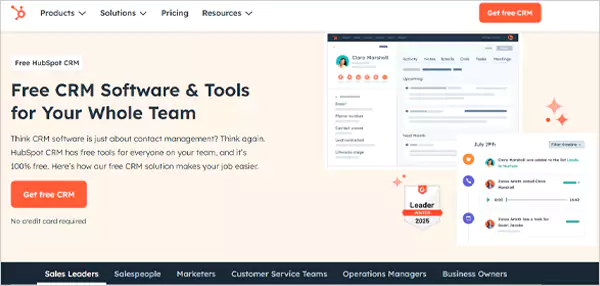
Another best pick for small business CRM needs is HubSpot. It offers multiple benefits to its users with free and budget-friendly pricing options, a user-friendly interface, and seamless integration.
Offering an integrated view of marketing, sales, and customer support, this solution is no less than an all-in-one platform. Both small and large enterprises can use it to streamline their sales endeavors.
Features: Custom Properties, Duplicate Management, Custom Objects, Required Fields, Standard Contact Scoring, Association Labels, etc.
Pricing: $20 a month per user as per the initial plan.
From major highlights to minor drawbacks, consider the following table for a quick evaluation of the software’s worth.
| Pros | Cons |
| For small businesses, HubSpot offers a very user-friendly, intuitive interface. | HubSpot CRM only offers limited customizability. |
| If you are looking for a cost-effective option, this CRM boasts a wide array of free features under its free plan. | Costs increase with upgrades, making it expensive to use. |
| This platform works very well with third-party applications, too. | |
| Offering an integrated view of marketing, sales, and customer support, HubSpot is no less than an all-in-one platform. |
5. Monday.com
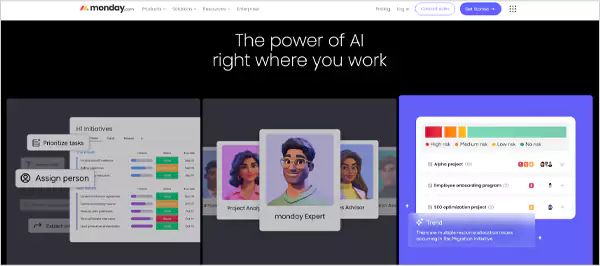
Next, Monday.com is fifth on our list of the best CRM for small businesses. It offers flexibility, customizability, and strong automation. However, the cost might seem high to many.
Besides, the intuitive design of this system makes it easy for team members to quickly learn how to use all its features and dashboards to the fullest.
Features: Dashboards, Integrations, Automation, AI, Docs, & more.
Pricing: The basic plan starts at $15, while standard and pro come with the following price tags, respectively: $20 and $33.
Let’s discuss the potential advantages and disadvantages of this Monday CRM.
| Pros | Cons |
| Users can take advantage of a highly intuitive drag-and-drop interface. | It lacks advanced features. |
| There is a robust support system available to fix your team’s learning issues. | Its free plan comes with real limitations. |
| With years of improvement, Monday offers a high level of customizability. | |
| This CRM system doesn’t even compromise on seamless integration experiences. |
6. Nutshell
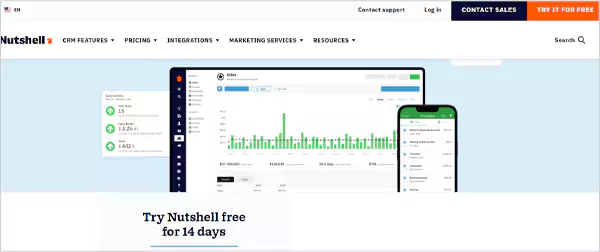
Every small business CRM searcher must consider Nutshell. This system offers a very user-efficient interface along with strong email integration and helpful automation.
With Nutshell, unlock your small business’s true potential. There are plenty of automation features. It saves time and effort, both. So, your marketing, sales, and customer support teams can achieve more each day.
Features: Sales Automation, Pipeline Management, Reporting & Analytics, & more.
Pricing: The basic plan starts at $19 a user a month. This plan comes with unlimited storage, accounts, and contacts.
For a quick assessment of the Nutshell, go through the following major upsides and downsides.
| Pros | Cons |
| Among all the options so far, this one boasts a very intuitive and learning-friendly interface. | Users might be disappointed by limited customizability. |
| Nutshell offers easy and hassle-free email integration experiences. | |
| There are plenty of automation features available. |
7. Salesflare
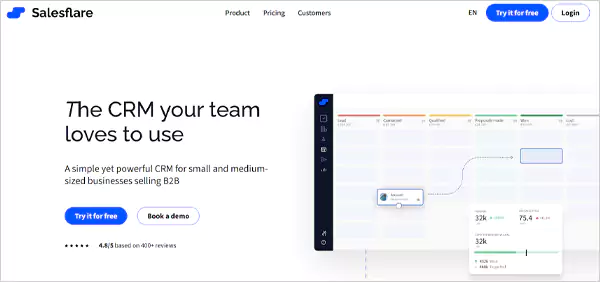
Salesflare is also among the best CRM for small businesses. If you are looking for a system that comes with a set of robust automation tools along with useful sidebars offering an integrated view of Gmail, Outlook, and LinkedIn, you have found your best option. This CRM software offers easy-to-use dashboards and modules.
Features: Robust Email Integration, Automatic Address Book Creation, Customisable Dashboards, & more.
Pricing: The software charges $35 with all the cutting-edge features.
The following table quickly glances at the major pros and cons of the system.
| Pros | Cons |
| Salesflare offers a user-friendly, intuitive interface. | Reporting features aren’t that advanced and come with limitations. |
| Small businesses can capitalize on its fabulous automated data entry capabilities. | Email tracking can be tricky, as the software sometimes adds wrong information. |
| On this CRM, leads can be easily imported. |
8. Folk
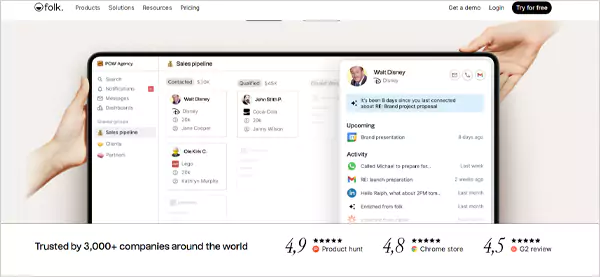
Many small business owners often use Notion for project management and team collaboration. For such people, using Folk would feel the same. This CRM software exhibits a striking resemblance to Notion as far as overall design and aesthetics are concerned.
Moreover, this is best if you are looking for an option that offers a simple way to manage leads and personalize emails.
Features: Email Automation, Lead Scoring, Behavioural Segmentation, & Campaign Tracking.
Pricing: The standard plan of this software costs $25 a month per user. In this plan, 500 enrichments and 2,000 emails per month are included. Besides, there is also a $50 higher plan per user per month. In this package, the numbers increase to 1,000 and 5,000, respectively.
Major positive and negative aspects are as follows.
| Pros | Cons |
| To capture the progress of each lead effectively, Folk offers advanced features with multiple-pipeline support. | Folk doesn’t have a mobile version of its CRM platform. |
| Folk offers robust AI capabilities for message personalization. | |
| On Folk, campaign tracking becomes super easy. |
9. Kommo
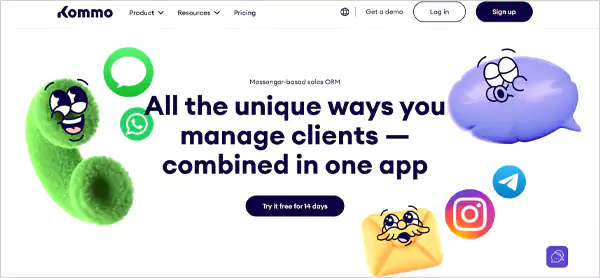
Kommo, as a CRM software, is compatible with Web, iOS, and Android. It is best known for its multichannel sales support. Now, even a small business can start leveraging all the platforms, whether online or offline, in order to streamline its sales efforts. Consider its key features below.
Features: Multi-channel Communication, Sales Pipeline Management, & Automation.
Pricing: The basic plan starts at $15 per user per month.
| Pros | Cons |
| Kommo provides for multiple configurable pipelines. | Task management tools are limited. |
| With Kommo, streamline your business with strong automation in communication. | There is very little customization available in reporting. |
| Leverage the power of AI-supported chatbots to get your queries sorted in seconds. |
10. Salesmate
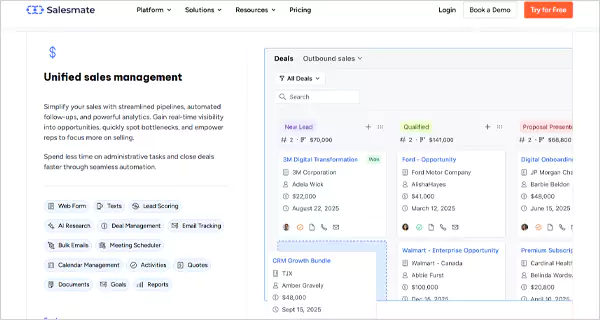
Salesmate is the best CRM for small businesses when it comes to working from the comfort of a smartphone screen. It is often crucial for small enterprises that team members are able to work on the go at the right moment to seize fleeting sales opportunities.
Therefore, a CRM system must function on all mobile devices effortlessly. And, without a doubt, Salesmate delivers this capability very well.
Features: Contact and Company Management, Activity Tracking, Deal Pipeline Management, Email Integration & more.
Pricing: The pro plan starts at $49 a month per user.
Consider the following table to do a quick comparative analysis between this CRM software’s key positives and negatives.
| Pros | Cons |
| An AI chatbot assistant is part of the CRM so that learning blocks can be fixed in no time. | Many users might find the software expensive, with $29 a month for a single user. |
| Users can enjoy customizable dashboards. | |
| Small businesses can speed up sales with strong automation. |
How to Choose the Best CRM Software for Small Businesses?
With a plethora of options available, it is bound to be overwhelming to choose the right CRM for small companies. It doesn’t just take time, effort, dedication, and resources, but specialized knowledge as well.
Thus, to assist you in your search, consider the following tips on how to find the best CRM software for your small start-ups.
- Specify and define your business goals. It will help you figure out which option serves your needs best. For example, suppose you require simple but functional CRM software. In that case, focus on such aspects, ignoring factors like customizability and AI features, which often come with a high cost.
- Consider your budget before researching so you can filter your options as per the financial limit.
- If you already use any tools, i.e., Outlook, Google Mail, etc., make sure the new CRM software is compatible with those. The system must ensure smooth integrations with third-party tools and applications.
- Prioritize user-friendliness over advanced features if you are planning to use a CRM for the first time. It will eliminate the challenge of a steep learning curve and related training costs.
- Don’t forget to utilize trial sessions if available. It will help you find out if the software really serves your needs best or just seemed that way during research.
- Sometimes, there are hidden charges too. Always research thoroughly before investing.
Additionally, before buying the subscription, make sure that the CRM you choose is migration-friendly so that if you ever need to switch in the future, you are not locked in or have to lose key customer data.
Conclusion
Finding the best CRM isn’t an easy task, even though you own a small business. There is a great deal of care that you have to ensure to land on the right fit. During the research, one shouldn’t miss out on key aspects, such as user-friendliness, feature-richness, customizability, enhanced reporting, and affordability. These essentials make the best out of CRM software, so every user can make the most out of their efforts, maximizing sales and profits over time.
FAQs
Q: What is the best simple CRM system?
Q: How much does a CRM cost for a small business?
Ans: It depends on the CRM software you buy. Yet, for an overview, you can read the pricing of each CRM system included in this article. The lowest plan starts from $15 per user a month.
Q: Does Google have a basic CRM?
Ans: No. Google doesn’t offer any CRM software.
Q: What is the best and cheapest CRM?
Ans: If you are looking for the best and cheapest CRM options, you can consider Flowlu, starting from approximately $6.5 per user a month. It also offers a free plan. Moreover, CRM systems of Vtiger, Monday, and Kommo start from $15 a user a month.
Q: Is there a free CRM for small businesses?
Ans: Yes, you can take advantage of the free version of Flowlu. Zapier also has a free plan.
Sources:

